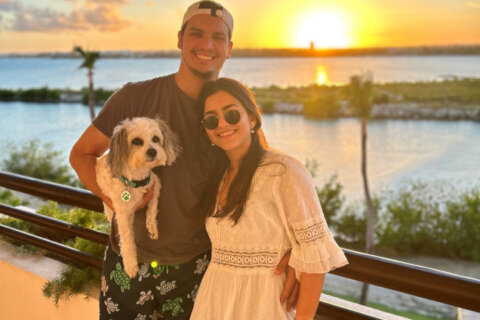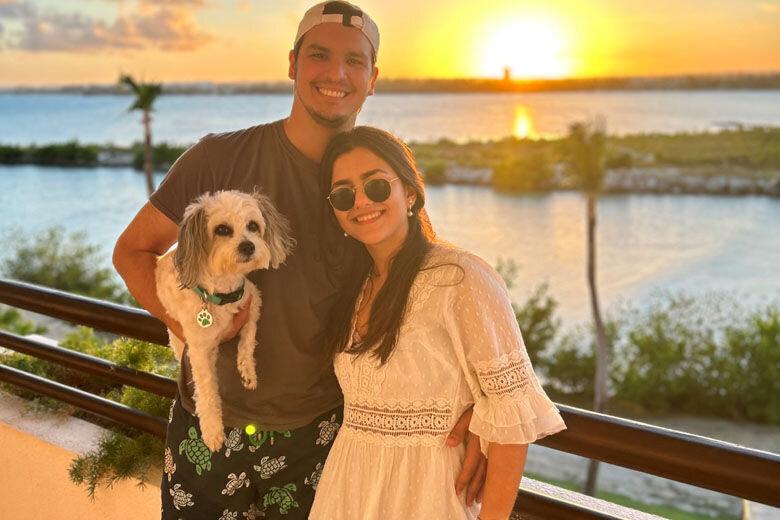
The Philadelphia man who prosecutors said downed several drinks at a D.C. bar before getting behind the wheel last January and crashing into an Uber, killing a promising George Washington University business student, was sentenced Friday to eight years in prison.
Before handing down his sentence, the judge called it one of saddest cases he’s ever handled.
Carlos Christian Rey, 24, was sitting in the back seat of the Uber with his girlfriend at the intersection of Massachusetts Avenue and 15th Street NW shortly after 6 p.m. on Jan. 15 when the Jeep Cherokee driven by Reginald Johnson, 31, slammed into the side of the car.
Christian’s girlfriend, Camila Selman, was seriously hurt in the crash, suffering a concussion and a fractured pelvis, among other injuries.
In one of several victim impact statements delivered during Friday’s sentencing hearing, Selman, who is a graduate student at Georgetown University, said she has suffered profound physical and emotional trauma since the crash.
Originally both from the Dominican Republic, she and Christian, her high school sweetheart, moved to D.C. after each had secured spots at their “dream schools” in 2022.
They were on their way to see the annual Georgetown GLOW light display when Johnson’s Jeep plowed into their ride-share.
“We were at our happiest, living the best stage of our relationship when our lives were turned upside down,” Selman said.
She said she has no memory of the crash because of her head injury. She was taken to Howard University Hospital, where the next day, after her family rushed to her side, she learned her boyfriend had been killed in the crash.
“The following days in the hospital remain a blur, a mix of tears, prayers, pleas for help and excruciating physical and emotional pain,” she said.
‘I will no longer see his smile’
Several of Christian’s family members, who traveled from the Dominican Republic for Friday’s hearing, remembered him as a “pillar of strength and kindness,” and the glue that held his family together.
“Carlos is one of the very few people of whom I can say that everything he was, was good,” Selman said.
A classmate at George Washington University read a statement on behalf of 55 other MBA candidates who are feeling “the sting of profound loss.”
“Carlos’ quiet charisma was magnetic,” Lucas Almeida said. He said his friend loved soccer and had dreams of working in corporate finance. “His gift for bridging divides and uniting people was nothing short of extraordinary.”
In a voice broken with sobs, Christian’s mother, Noelia Rey, said, “I will no longer see his smile. I will no longer hear his ‘Hello, Mom.’ … I will not be present at his graduation and wedding. I will not be able to see the grandchildren he wanted to give us.”
She pleaded with the judge to sentence Johnson to the maximum punishment “and send a clear message that the law is to be respected.”
Previous drunken driving arrest
Johnson, a Morgan State University graduate with ties to Maryland, was initially charged with second-degree murder, but he was offered a plea deal in June in which he agreed to plead guilty to involuntary manslaughter and assault with a dangerous weapon.
Johnson faced a maximum of 40 years in prison on both those counts, but the sentencing guidelines recommended a maximum of 12 years, which prosecutors asked for.
Assistant U.S. Attorney Jamie Carter told the judge that while Johnson may not have set out to kill someone that day, he made a series of irresponsible decisions that ultimately led to Christian’s death.
Carter said surveillance video from inside the D.C. bar where Johnson and his friends were drinking showed he had six drinks in four hours on the afternoon of Jan. 15, and then left to head to another bar, piling seven people into his Jeep Cherokee even though it only fit five people.
“He was driving at speeds that are utterly unsafe inside the District,” Carter said, going 61 mph in a 25 mph zone before he crashed into the Uber that was making a left turn.
She said Johnson was previously arrested in Maryland in 2015 for driving under the influence, but successfully completed probation and did not have a criminal conviction.
In addition to justice for the families, Carter asked the judge to impose a stiff sentence to send a message to other reckless drivers.
She said there have been 45 deaths in major traffic crashes in D.C. this year alone.
“The District is struggling, and how your honor sentences these cases matters,” Carter said.
Johnson: Expresses ‘deepest remorse’
Ahead of the sentencing, defense attorney Derrick Hamlin said Johnson had given up alcohol after his previous drunken driving arrest but began drinking socially again after the death of his mother.
The defense attorney said Johnson, who started his own small construction company, has a long history of volunteer and community service, including coaching youth football, mentoring and volunteering with his Morgan State fraternity.
During Friday’s sentencing, Johnson made a statement apologizing to the family and expressing his “deepest remorse” for his actions.
He said he met up with friends for brunch that Sunday afternoon. “And unfortunately made a decision that changed the lives of multiple families forever,” he said.
He added, “There is no excuses or justification for my actions that evening. There can never be a justification for ending Christian’s life.”
In his remarks, Johnson referred to the victim using one of his last names, Christian, instead of his given name, Carlos.
In a voice wavering with emotion, Johnson said he would change places with the other man if he could. “You did not deserve to lose your life because of my irresponsibility,” he said.
Addressing Christian’s family, Johnson said, “It would not be right to ask anyone for forgiveness. I understand that may never come. I will continue to pray for your healing and peace, for you and your family daily.”
Before handing down his sentence, D.C. Superior Court Judge Robert Okun called it an “incredibly sad case — one of the saddest I’ve ever seen.”
He said Johnson’s behavior was “incredibly, incredibly irresponsible,” but that Johnson did not intend to kill anyone.
“It was reckless. It was tragic. But it clearly was not intentional,” Okun said.









